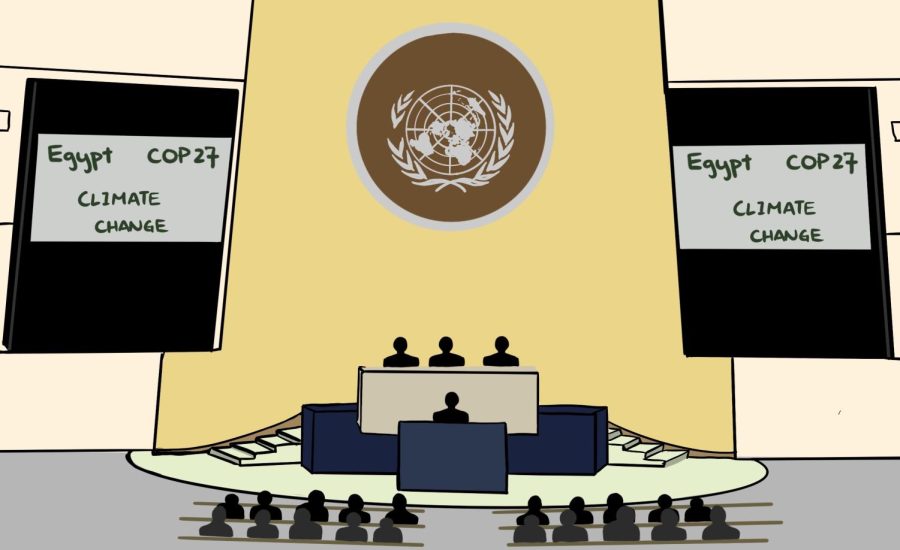International relations class reflects on UN climate change conference
Dr. Robert Fish’s international relations class completed a simulation of COP27.
December 13, 2022
The 2022 UN Climate Change Conference, or COP27, was held from Nov. 6 to Nov. 18 in Sharm El Sheikh, Egypt. The negotiators this year focused on enforcing the 2015 Paris Agreement on limiting global temperature rise to within 1.5 degrees Celsius above pre-industrial levels, building resilience to climate impacts, and allocating enough funds to meet financial needs of the transition to a carbon-free economy. The International Relations class taught by Robert Fish, the Dean of Global Studies, is currently doing a UN Climate Change Conference Simulation where each group of students will represent one country and articulate their standpoints on climate change.
The previous climate change conference, COP26, was held in Glasgow, Scotland, United Kingdom. The main achievements of the conference was the Glasgow Climate Pact which aimed at curbing greenhouse gas emission and gathering financial support for climate change projects from public and private sectors. The establishment of Green Grids Initiative – One Sun One World One Grid (GGI-OSOWOG) connected energy grids across borders to facilitate a faster transition to the use of renewable energy. However, the result of the conference was disappointing: developed and wealthier nations refused to adhere to the Paris Agreement in controlling temperature increase within 1.5 degrees Celsius and never delivered their promised monetary funds –– $100 billion per year –– for climate change initiatives in vulnerable countries.
Fish said that “In terms of relations amongst the major powers, the most obvious change being when this occurred last year, there were tremendous tensions in Europe but war had not broken out. And since the war broke out, that’s had a major effect on nations throughout the world in terms of food supply, politics, energy supply, and negotiations related to climate change.”
The current major problem in the climate change transition is to attract enough private and public sector funding into facilitating the climate change projects. Articles on the Internet are mainly polarized: one side claiming that private sectors can win against climate change, the other arguing that the public sector must play a major role in funding climate change projects.
On January 20, 2022, President Biden signed the instrument to bring the United States back to the Paris Agreement and promised to cut all greenhouse gas emissions from the nation’s electric sector by 2035. This year at COP 27, Biden announced new initiatives to strengthen America’s dedication and support in Climate Change projects. In addition to that, the G7 meeting just pledged $100 million to contribute to poorer and developing countries.
Fish said, “Our International Relations class did a simulation on COP27 and the idea was to have different nations involved that presented interests, both in terms of financial interests, political interests, or energy use interests. Through the simulation, I wanted the students to look at climate change from the perspective of multiple different nations and to understand concretely what controversies related to climate change are being debated now.”
Stella Simonds ‘23, a student of the International Relations class, said, “I think overall the simulation we did in class was very fun and I learned a lot about the Paris Agreement, the Glasgow Pact, and different country’s perspectives on climate change projects. I have a much better understanding of the significance of the annual climate change conference.”





